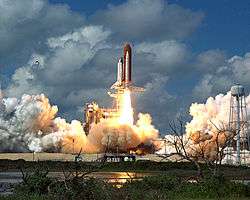1988 in spaceflight
The following is an outline of 1988 in spaceflight.
 Space Shuttle Discovery launches on STS-26R, the first US crewed spaceflight after the Challenger accident | |
| Orbital launches | |
|---|---|
| First | 6 January |
| Last | 29 December |
| Total | 121 |
| Catalogued | 116 |
| National firsts | |
| Satellite | |
| Orbital launch | |
| Space traveller | |
| Rockets | |
| Maiden flights | Ariane 4 Long March 4A Shavit |
| Retirements | Energia Titan 34D |
| Crewed flights | |
| Orbital | 5 |
| Total travellers | 19 |
Launches
| Date and time (UTC) | Rocket | Flight number | Launch site | LSP | ||
|---|---|---|---|---|---|---|
| Payload (⚀ = CubeSat) |
Operator | Orbit | Function | Decay (UTC) | Outcome | |
| Remarks | ||||||
| 7 June 21:38:16 |
||||||
| Low Earth (Mir) | Mir EP-2 | 7 September 00:48:38 | Successful | |||
| Crewed flight launching three cosmonauts and landing two, computer problems during deorbit nearly resulted in loss of crew, and delayed landing by one day | ||||||
| 7 July 17:38 |
||||||
| Intended: Areocentric Actual: Heliocentric |
Mars orbiter | In orbit | Spacecraft failure | |||
| stationary lander | Phobos lander | In orbit | Never deployed | |||
| Loss of communication 2 September 1988 en route to Mars | ||||||
| 12 July 17:01 |
||||||
| Areocentric | Mars orbiter | In orbit | Spacecraft failure | |||
| stationary lander | Phobos lander | In orbit | Never deployed | |||
| "hopping" lander | Phobos lander | In orbit | Never deployed | |||
| Loss of communication 27 March 1989 near Phobos | ||||||
| 29 August 04:23:11 |
||||||
| Low Earth (Mir) | Mir EP-3 | 21 December 09:57:00 | Successful | |||
| Crewed flight with three cosmonauts, one remained on Mir as part of EO-3, first Afghan space traveller | ||||||
| 29 September 15:37:00 |
||||||
| NASA | Low Earth | Satellite deployment | 3 October 16:37:11 | Successful | ||
| NASA | Geosynchronous | Communications | In orbit | Operational | ||
| Crewed flight with five astronauts, first US crewed spaceflight after the Challenger accident in 1986, TDRS deployed using Inertial Upper Stage | ||||||
| 15 November 03:00:02 |
||||||
| Low Earth | Test flight | 06:26 | Successful | |||
| Low Earth (Buran) | Test flight | Successful | ||||
| Uncrewed test, only flight of Buran and final flight of Energia | ||||||
| 26 November 14:49:34 |
||||||
| Low Earth (Mir) | Mir EO-4/EP-4 | 27 April 1989 02:57:58 | Successful | |||
| Crewed flight with three cosmonauts | ||||||
| 2 December 14:30:34 |
||||||
| NASA/NRO | Low Earth | Satellite deployment | 6 December 23:30:39 | Successful | ||
| NRO/CIA | Low Earth | Radar imaging | 25 March 1997 | Successful | ||
| Crewed flight with five astronauts | ||||||
Deep-space rendezvous
There were no deep-space rendezvous in 1988.
gollark: I feel like that would just be OCaml but the ecosystem is even more nonexistent.
gollark: It has nice features but also horrible things.
gollark: I tried using it for stuff and I disliked it.
gollark: Haskell is obviously no, Python is quite slow and has different ecosystem problems as well as a remarkable amount of weird inconsistency, JS dependencies break after about 5 months and it's an awful language, Rust is somewhat nice but annoying compared to higher level languages, Clojure is maybe good however Lisp and also Java (well, JVM), and... that's about it?
gollark: OCaml suffers from the same sort of ecosystem problem.
References
Generic references:

- Bergin, Chris. "NASASpaceFlight.com".
- Clark, Stephen. "Spaceflight Now".
- Kelso, T.S. "Satellite Catalog (SATCAT)". CelesTrak.
- Krebs, Gunter. "Chronology of Space Launches".
- Kyle, Ed. "Space Launch Report".
- McDowell, Jonathan. "Jonathan's Space Report".
- Pietrobon, Steven. "Steven Pietrobon's Space Archive".
- Wade, Mark. "Encyclopedia Astronautica".
- Webb, Brian. "Southwest Space Archive".
- Zak, Anatoly. "Russian Space Web".
- "ISS Calendar". Spaceflight 101.
- "NSSDCA Master Catalog". NASA Space Science Data Coordinated Archive. NASA Goddard Space Flight Center.
- "Space Calendar". NASA Jet Propulsion Laboratory.
- "Space Information Center". JAXA.
- "Хроника освоения космоса" [Chronicle of space exploration]. CosmoWorld (in Russian).
Footnotes
This article is issued from Wikipedia. The text is licensed under Creative Commons - Attribution - Sharealike. Additional terms may apply for the media files.